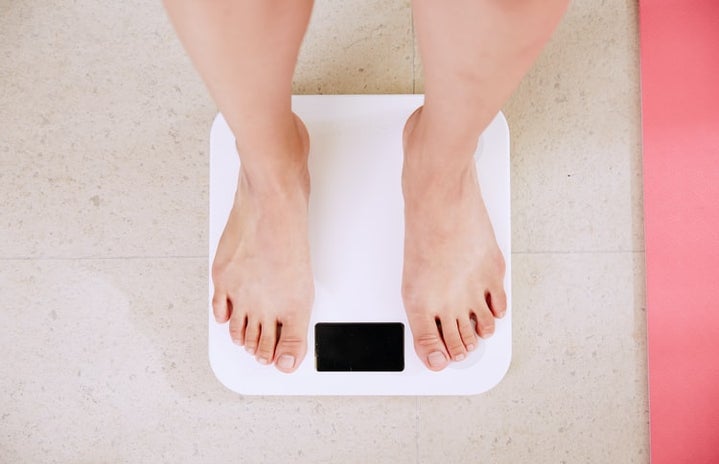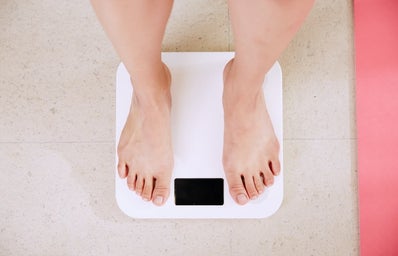(The following piece delves into sensitive topics concerning eating habits.)
On Mondays, I have about eight hours of classes straight and eating is not always an option. Eating before I leave my house isn’t always an attractive prospect since I’m rarely hungry in the morning and am usually running around getting a few things together. Buying food hurts my bank account and it’s taken enough beatings from me ever since I started college.
The numbers on my scale have never gone beyond a certain amount, despite my few attempts at getting them to go higher. I’ll pick up protein bars and Ensure milks and eat pasta at 11 pm but I’m never consistent enough to make a change.
My grandma teases me when she sees me, encircling my waist and telling me to eat more but most other women grab at my sides and tell me they wish they looked like me.
Recently, SDSU invited Los Angeles based Salvadoran poet, Yesika Salgado to the union theater where she read from some of her books and shared stories about her experiences. The event came at the perfect time for me since I’d been noticing my eating habits more closely that week and Salgado often talks about her experience as a self-described fat woman.
The crowd snapped, clapped, and hollered encouragingly as Salgado spoke about intersectionality and feminism and as she delved further into personal messages that take courage to share. She said that a writer’s job is to create a mirror for readers, but I don’t think it’s fair to pretend like the issues that arise for me in regard to eating during the semester are necessarily comparable to those who gain weight instead of lose it.
I think my stories would be different if I had a slow metabolism instead of fast.
The crowd hushed that day as Salgado read through “The Almost Death”, a poem she had published in her book “Corazón.”
“Did I tell you about the time I was dying?” She began. Then, she pieced together her tale thread by thread, depicting the moments when her uterus was bleeding due to hemorrhaging but doctors ignored her need for medical attention due to her “fatness”.
“The doctors paraded in and out reaching between my legs,” Salgado said, “Dozens of men pulling my lips apart shaking their heads. ‘I’ve been here before’ I thought, on my back, on a bed with a man disappointed.”
I can’t say I’ve ever had an experience like Salgado did. When I go to the doctor, I’m nervous about what she is going to say about my weight, but I don’t feel the way Salgado did. I may feel disappointed in my eating habits, but I do not feel ashamed of my body as a whole. I have never been made to feel that way and that’s something I have to acknowledge when talking about healthy eating. Salgado’s experiences are unique but there’s a pattern that exists with medical professionals dismissing the needs of patients due to heavier weight.
It’s not realistic for me to make avocado toast every day or stop by Starbucks but I am responsible for what I ingest and don’t. I blame myself for my dietary habits while also acknowledging that sometimes I feel like I have to prioritize a textbook I’m not going to use or gas over a meal sometimes. I’m also ok with admitting that my losing weight over those things overall has less impact on my mental health than if I was instead gaining weight.
It isn’t fair either. I’m not entirely sure what the solution to these issues is. How can a student be expected to perform at their best ability when their next meal comes with a mental reminder to also stop at the gym? How am I considered healthier than the woman beside me who spends hours at the gym weekly and has an actual dietary plan? I’m healthier because I skip meals all the time out of poor time management and little appetite due to stress? I’m healthier because the meals I do eat I make in my own house? Not because it’s better but because it’s cheaper. I don’t know, I don’t buy it.
I’ll tell anyone: college can both negatively and positively affect your eating habits but my bad tendencies are accepted simply because I’m skinny. You can’t know someone’s eating habits solely by looking at them and we’d do well not to judge people too harshly either.
You can’t know based on a look alone whether someone has a slow metabolism but healthy eating habits or the opposite. For all intents and purposes, I can’t place one person higher up on the metaphorical scale of social success simply because they weigh less on the metal one they’ve been forced to keep in their bathroom. We focus on eating habits because we’ve been told by social media that our weight summarizes how much we care about ourselves. Our weight supposedly lets someone know how lazy we are or how far gone we’ve let ourselves get.
I’ve heard that before the 1880s, weight used to be a sign of aristocracy because it meant people could afford food during famines. Nowadays, we’re told eating is bad and luxury restaurants are ironically known for serving ridiculously small portions. The rules change but the message stays the same : our worth is tied to our mass.
All I’m saying is, it’s not.

